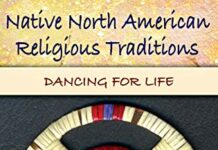
Ebook Info
- Published: 2012
- Number of pages: 170 pages
- Format: PDF
- File Size: 1.48 MB
- Authors: Jordan Paper
Description
Provides a theology of polytheism—the belief in many deities—using examples from a wide range of world religions.The Deities Are Many is a lively and learned introduction to polytheism. Drawing from both his scholarly research and his personal experience, author Jordan Paper is the ideal guide into this milieu. Paper was drawn to polytheism through his love of nature, seeing it as a source of the divine. In this book he focuses on Chinese and Native American religious traditions, as well as West African, African-Brazilian, Hindu, Polynesian, and circum-Polar traditions, to describe the theology of polytheism. The book provides a topology of polytheistic deities, focusing on the cosmic couple, Father Sky and Mother Earth; animal, plant, and mineral deities; ancestral spirits; divine ghosts; and culture heroes and tricksters. Paper also shows how monotheists misunderstand polytheism and provides a polytheist perspective on what it means to be human when the “deities are many.” This is a fascinating, illuminating book, especially for those raised in monotheistic societies.Jordan Paper is Professor Emeritus of Humanities (Religious Studies, East Asian Studies) at York University. He is also an Associate Fellow at the Centre for Studies in Religion and Society and Adjunct Professor in the Indigenous Governance Program at the University of Victoria. He is the author of several books, including The Mystic Experience: A Descriptive and Comparative Analysis and The Spirits Are Drunk: Comparative Approaches to Chinese Religion, both published by SUNY Press, as well as Through the Earth Darkly: Female Spirituality in Comparative Perspective and Offering Smoke: The Sacred Pipe and Native American Religion.
User’s Reviews
Reviews from Amazon users which were colected at the time this book was published on the website:
⭐It is not often you find a book that speaks to you and helps you understand yourself and others in simple language with real examples. This book is required reading for my Pagan Theology class and we are reading different chapters through the “course of the course”.It is not dry like many of the other academic works but at least for me holds my interest and SO positively explains a spirituality that often stems from a life very different from the mainstream (i.e. summers in the North Country, hunting, growing your own food, encounters with wild lands and wild spirits). The author speaks from experience and relates personal stories. Regardless of your own spiritual path, you are likely to find reading this book to be an enriching experience.
⭐I found this book quite illuminating. It’s an interesting exploration of a perspective on theology that was pretty foreign to me as someone raised in a monotheistic household and culture.
⭐This is a well written book from the perspective of a polytheist. You get a lot of details that would be missing had the book been written from an outside perspective. Most books on religion are dry but this one isn’t. The books pretty thin but there is a lot of information packed into those pages. The book gives a survey of some polytheistic religions which is handy because you know where to look for more info on how various religions handle a given need. For instance, charity, temple building and maintenance.
⭐This book by Professor Jordan Paper merits reading. However, the author failed to meet his own academic standards by omitting both footnotes (at times sorely missing, ex. gr. references to religious texts) and a glossary. The index is incomplete, leaving out for example Prof. Max Müller who is mentioned in the text. From an academic who refers to Western science as one of his own major mind-sets one expects more.Prof. Paper’s critiques of Abrahamic, patriarchal religions are succinct and to the mark but he did not sufficiently underscore similar tendencies in ‘polytheistic’ religions of patriarchal civilisations like ancient Greece. Alas, he did not follow his own conclusions in writing the book, ex. gr. to use ‘thealogy’ instead of or with ‘theology’ and by referring to “A Polytheistic Theology” in the title whilst stating explicitly in the text that ‘polytheism’ is a pejorative label invented and applied to all forms of Heathenism by proponents of Abrahamic religions.Prof. Paper emphasised the experiential, ‘subjective’ nature of religions in general and non-Abrahamic ones in particular. He weaved his own experiences – and biases – into the text. Frequent amongst North Americans who have never lived in Europe, this north-western peninsula of Eurasia appears in the book like a large Christian mass much like North American, in spite of its very high degree of differentiation into some 40 officially recognised languages, many climates, countries, regions, cultures and ethnic groups. Prof. Paper forgot to mention that Christendom’s victory over Heathenism required several centuries of bitter warfare and was not essentially accomplished until the conquest of Saxony by Charlemagne’s Frankish alliance at the end of the 8th century CE.The author mentions some bridges like The One – The Many and Unity – Multiplicity being indispensable to each other as shown by Angels and sometimes Saints in Abrahamic religions, although their adherents usually display little to no interest in such bridges to Heathenism. Another bridge is the direct divine inspiration claimed by many heathen authors for some of their writings, ex. gr. by Three Female Muses for Hesiod’s “Theogony”. Could Greek Heathens rightly claim to be a ‘people of the book’?The author often illustrates the extreme imbalance of Abrahamic religions in their preference, clearly confirmed by the masculine linguistic genders, names and attributes of their ‘God’, for the Active-Male over the Passive-Female, both in principle and in manifestation. This tendency, however, was already marked by paternalistic civilisations like ancient Greece and Aryan India. One can indeed scarcely imagine Christians praying to “Our Mother Who is in the Earth” or Muslims to “Allat”, even if She were not considered part of an all-female Trinity.Prof. Paper deserves special credit for his explicit critiques of New-Age and feminist exaggerations, ex. gr. of parts of Wicca, that are indeed often contrary to the self-understanding and practices of traditional forms of Heathenism. Hardly surprising in view of Wicca’s establishment almost exclusively by white Anglo-Saxons of Christian protestant origin.The author frequently referred to traditional Chinese religions to which he has direct family links. Alas, he did not mention by what portion of the population such religions, including for example family alters for Ancestresses, Ancestors and other Divinities, are currently practised in China.Prof. Paper’s ‘thealogy’ remains somewhat ambiguous in respect of ‘good-bad’ (rather than ‘good-evil’). His attribution of ‘bad’ (defined apparently according to conventional human mundane well-being) at least in part to hazardous events indicates perhaps a reluctance to directly comprehend forces known in some traditions as ‘malefic’, represented chiefly by Mars and Saturn.
⭐I think there ought to be more books on polytheism, so I tend to be generous in rating them. And Jordan Paper makes some good points about polytheism and the ways in which it is superior to monotheism.The author begins by explaining what he means by “theology.” Theology to him can mean “to theorize from within a particular tradition.” But that does not suffice to define the term to me.We find out that the Goddesses and Gods are fairly diverse. My favorites are the perfections of attributes (such as strength, honesty, wisdom, cooperation, adventure, and so on). But others are simply representatives of non-humans (such as trees, earth, sky, or the entire planet). And some are specific to given locales, so that your Goddess may have no jurisdiction over the valley on the other side of the mountain where your neighbors live.The author discusses many of the North American and Chinese Deities and explains their natures as well as how they are hailed. There are sections on ancestral spirits, and divine ghosts.Paper explains that polytheism is natural to humans. And that the Gods and Goddesses tend to be hailed or adored, not feared. While the term “worshipper” may be appropriate for many monotheists, the more common term for polytheists is “devotee.” Paper explains that the polytheistic deities “tend to be more companionable than a single, absolute, monarchial deity.”The author explains that for polytheists, there is no concept of “heresy.” There simply is no single religious dogma to be denied. That’s not true for monotheists, who often confuse their dogmas with empirical truths. And that can lead to a very destructive fanaticism among monotheists. In addition, we can see that the major monotheistic religions tend to favor Men over Women, and can favor one race over another as well.In my opinion, we humans are varied and fickle and thus need to worship a big bunch of Goddesses and Gods. And Paper seems to imply this as well: he points out that if our prayers to one deity are not answered, it is normal to consider switching to some other deity.One obvious aspect of modern monotheism is its stultifying authoritarianism. And Paper does explain that polytheism is useful, enjoyable, and exhilarating. Still, I would have appreciated more of a discussion about the lack of authoritarianism in some forms of polytheism.Since Paper does discuss the problems of monotheism in leading us humans into conflict, I was hoping he would draw some conclusions about the future of polytheism. One possibility is that the future will be much like the past: the polytheistic religions that correspond to the human spirit will be defeated by a few monotheists at gunpoint. But I think it is more likely that such impositions of the religions of others will eventually be rejected by society, that we’ll return to the Gods and Goddesses, and that They will return to us.
Keywords
Free Download The Deities Are Many: A Polytheistic Theology (SUNY Series in Religious Studies) in PDF format
The Deities Are Many: A Polytheistic Theology (SUNY Series in Religious Studies) PDF Free Download
Download The Deities Are Many: A Polytheistic Theology (SUNY Series in Religious Studies) 2012 PDF Free
The Deities Are Many: A Polytheistic Theology (SUNY Series in Religious Studies) 2012 PDF Free Download
Download The Deities Are Many: A Polytheistic Theology (SUNY Series in Religious Studies) PDF
Free Download Ebook The Deities Are Many: A Polytheistic Theology (SUNY Series in Religious Studies)

